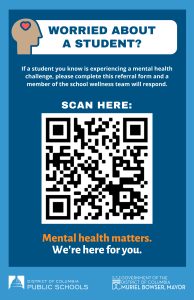school.mentalhealth@k12.dc.gov
website support: kevin.parker2@k12.dc.gov
Crisis Support Contact Numbers
Emergency: Dial 911 if you or someone you know is in immediate danger or go to the nearest Emergency Room
Access Helpline: 1-888-793-4357 (D.C. Dept. of Behavioral Health)
1(888)7WE-HELP. This 24-hour, seven-day-a-week telephone line is staffed by behavioral health professionals who can refer a caller to immediate help or ongoing care.
Community Response Team: 202-673-6495 (D.C. Dept. of Behavior Health)
offers 24-hour services to communities experiencing psychiatric emergencies, trauma, or show signs of mental health and substance use disorders.
Suicide & Crisis Lifeline: Call or Text 988. The Lifeline provides 24-hour, confidential support to anyone in suicidal crisis or emotional distress. Call or text to connect with a trained crisis counselor. https://988lifeline.org
CrisisLink Suicide Hotline: 703-527-4077
La Clinica del Pueblo (Spanish) Mental Health Hotline: 202-462-4788
ChAMPS: 202-481-1440 (Child and Adolescent Mobile Psychiatric Service) is an emergency response service for children, teenagers and adolescent adults who are having a mental health or behavioral health crisis
PIW: 1-800-369-2273 (The Psychiatric Institute of Washington) offers comprehensive behavioral healthcare to children, adolescents, and adults who are experiencing mental health and substance abuse issues.
- Home
- About
- Articles
- Docs
- Provider Directory
- Events
- Agencies
- DC Public Schools (DCPS)
- Department of Behavioral Health (DBH)
- Child and Adolescent Mobile Psychiatric Service (ChAMPS)
- Families and Youth in Transition Program (FYTP)
- DC Special Education Hub
- Drug Free Youth
- Stop Bullying
- Early Stages
- DC Reading Clinic
- Inova Employee Assistance (EAP)
- Psychiatric Institute of Washington (PIW)
- National Institute of Mental Health (NIMH)
About us
The DC Public Schools (DCPS) School Mental Health Team and our many partners provide supportive academic supports and mental health services to our students and families
Contact Us
© 2023-2025 School Mental Health - DC Public Schools



